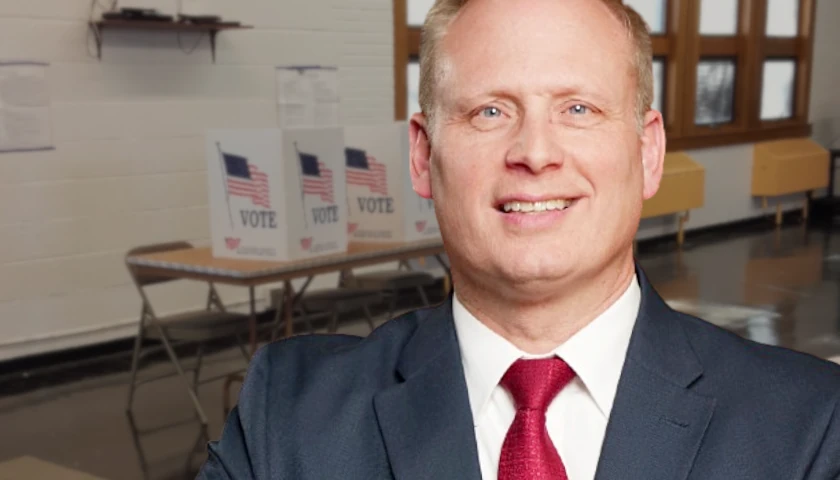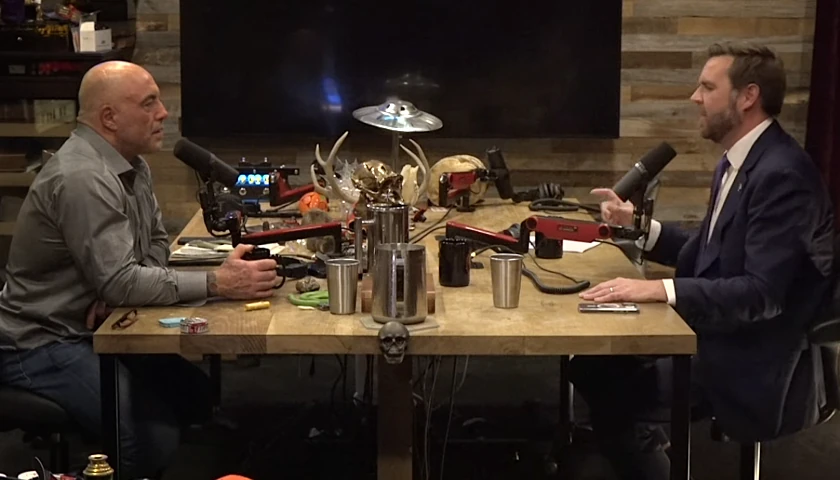Pinal County Supervisor Kevin Cavanaugh filed a complaint with the Arizona Attorney General’s Office asking for an investigation into possible election fraud in Pinal County’s primary election. He examined the ballot counting and said he believed six of the local races were artificially manipulated, and he also heard from a friend that a county elections IT employee confessed to taking hush money regarding the cheating.
Cavanaugh ran for Pinal County Sheriff and became suspicious after he lost in the primary. Looking into things, he said in a 19-page report he issued about the problems, “A recording exists of a discussion about hush-money payments being made to an employee inside elections and we have turned that over to outside law enforcement.”
Cavanaugh provided The Arizona Sun Times with a copy of the recording he made and said that the FBI is investigating.
Cavanaugh (pictured above) said in his report, “In late June or early July, a candidate for office of Assessor named December Cox met with me, Supervisor Cavanaugh. Cox came to my home because what he had to say couldn’t be said over the telephone. Cox reported to me he had met an employee from inside the Elections Office who said he was being paid ‘hush money’ and ‘knew it wasn’t right.’” Cox lost his race for county assessor by 42 points to incumbent Douglas Wolf.
Cavanaugh and his wife are accountants who worked with two statisticians examining the drops of ballots that were counted. He found that in six local races — sheriff, county attorney, three supervisor races, and assessor — the number of ballots that came in during the election in batches appeared to be artificially manipulated. Instead of each candidate in those races getting varied numbers of ballots each time, their numbers stayed the same, flatlining — meaning the candidate who won generally got the same percentage of ballots in each successive drop, while the candidate who lost also received the same percentage of ballots in each successive drop, but a lower number.
In contrast, the other races in Pinal County showed varying percentages in each ballot dump for all the candidates.
Cavanaugh’s report contains graphs showing the flatlined results in the six races, which he provided to The Sun Times along with graphs of races that he said he believed had normal results. He said, “Our hypothesis was that data had been manipulated and some candidates reduced by a given percentage while another was increased.”
He explained, “The common observation was that each time the vote totals were updated each race demonstrated the exact same percentage splits between the candidates. This is possible, but to have it occur more than a couple races in a county is rare, to have it occur in six races among 13 candidates is statistically ‘impossible.’ The anomalies only occur in county, not state races, yet the same voters filled out the ballots.”
The Pinal County Supervisor added, “Normal distributions show a differentials between around 4 and 10%, the Abnormal distributions have a very low differential, from 0% to 1.6% in the examples shown. No differential means that voters all over the county would be voting in the exact same percentages, it isn’t possible.” Cavanaugh labeled the anomalies the “‘Flying Purple Rhinoceros’ that doesn’t exist in real life.”
Two members of the Conelrad Group, a think tank based in southern Arizona that investigated election anomalies in Pinal County’s 2022 election and concluded there was “deliberate malfeasance,” spoke to The Sun Times after reviewing Cavanaugh’s report.
“After careful review of the data-sets presented by Pinal County Board of Supervisor Kevin Cavanaugh, I am in 100 percent agreement with his hypothesis,” said Jack Dona, who holds 43 intelligence and technical certifications and diplomas from civilian colleges, technical schools, and military academies, and who served in military intelligence, retiring as a master sergeant/first sergeant.
“In Electronic Warfare Systems, the systems are always calibrated to produce a desired output response to gathered information,” he said. “Variables in data collected and presented, should present to the content reviewer a noticeable difference in that collected and reported data. In the case of several of the down ballot races in Pinal County, the data does not show a variance over time, but instead a flat line reporting of the data over time. In short, the voting trend lines, over time, should show a wavy response. In the races pointed out by Supervisor Cavanaugh for suspected machine manipulation, we see a flat line response. This almost always indicates a system failure or an injected, and possibly illegal, man-made ‘calibrated’ system response due to human intervention.”
Dona said there needs to be a full hand count of the ballots to resolve the issue. “The only way to definitively put this issue to rest for the voting public is for the Pinal County Board of Supervisors to order a full and 100 percent ballot audit of all the elections in Pinal County for the 2024 Primary,” he said.
Tim Laux, a database expert who is also with the Pima Integrity Project, told The Sun Times how he believes the ballot counts may have been altered. “Is it possible votes were flipped? Yes. Is it possible that assuming votes flipped the numbers were changed by some program located on the USB stick? Yes. Is it possible that when the USB sticks made their way to the computer that gathers the batch results from tabulating, once uploaded, the numbers could have been altered by the canvassing software? Yes. Is it possible that mail-in ballots can be inserted while in transfer from location A to location B? Yes. Is it possible that as counting and tabulating ballots additional ballots were inserted? Yes.”
One of the races that Cavanaugh highlighted was the county attorney’s race. Cavanaugh told The Sun Times that, unlike the other five races, there was not enough manipulation done to flip the race since the alleged cheaters did not realize that conservative challenger Brad Miller would beat incumbent and election fraud denier Kent Volkner by almost a 40 percent margin. Instead, Miller appeared to defeat Volkner by almost 10 percent.
The report said a whistleblower from inside county elections contacted Cavanaugh in December 2023, who “described various problems inside the elections office, including apparent lack of security for ballots.” Cavanaugh informed Volkmer. “Volkmer came out with a statement and said no wrongdoing occurred, but he had not contacted or identified the Whistle Blower,” the report said.
Cavanaugh expressed concern that some of the election equipment was hidden outside the view of cameras and observers. “It is important to note that Pinal County had two extra computers with complete elections software and an extra tabulator out of sight of the cameras, and outside visibility poll workers,” he said in the report. Cavanaugh “asked the Elections Director Matthew to place these computers and the old tabulator in front of the cameras. During that phone call the Elections Director agreed to, but never did. The tabulator and laptops remain out of the public view for the remainder of the election.”
His report also pointed out that the county purchased election equipment with Wi-Fi access. “Earlier this year our office received a copy of a Purchase Order dated December 19th, 2023 for two Dell laptops equipped with the software from ES&S to run the tabulators (EVS 6.3.0.0),” the report said. “I noticed that these computers were WI-FI enabled, which was concerning.” When he asked about the Wi-Fi access at a board of supervisors meeting, he said the chair, Mike Goodman, “closed questioning on the topic.”
Cavanaugh’s report analyzed whether advertising could have affected the flatline results and determined that it did not.
During the board of supervisors meeting on Monday to discuss accepting the canvassing of the election, Cavanaugh attempted to bring up his concerns about the irregularities but was prevented by Goodman.
Goodman said the board “has no authority to change vote totals, reject the election results or delay certifying the results without express statutory authority or a court order that express statutory authority is actually found in the statute,”
Cavanaugh started speaking anyway, “I am aware that 500 candidates have expressed that very strange level of … the candidates came to me and said that there was no difference in the returns between early and polls. So in my role as a county supervisor, I’m rejecting the integrity of their election.”
As soon as Cavanaugh began speaking, Goodman began banging his gavel, but he did not stop banging until Cavanaugh finished. Cavanaugh said he would accept the canvass results, but only “under duress.” One of the other supervisors declared, “This is a shameful situation here today, shameful. It’s a clown show. We have one duty to canvass these ballots, and we can’t hardly get it done; accusations that were false, or horrible.”
Pinal County’s primary election aroused suspicion during early balloting due to someone within the elections department reportedly revealing that two Republican candidates were lagging behind their opponents in early tabulations. While elections departments have revealed early results of how many Democrats and Republicans voted before Election Day — which might violate the law — legal experts told The Sun Times that revealing different vote counts between Republicans in primaries is especially concerning.
Cavanaugh’s report also addressed the leaked information about the two candidates and said nothing was done. “The Deputy County Attorneys present said that because no specific names were mentioned, no crime occurred,” the report said. “However, the attorneys had not interviewed anyone or gathered any evidence.”
Cavanaugh noticed anomalies in three county supervisor races: District 1, where Rich Vitiello defeated Ron Weber by about 17 percent; District 4, where Jeffrey McClure defeated Pete Sabin by about 24 percent; and District 5, where incumbent Jeff Serdy defeated Todd House by about 23 percent.
Miller does not have a Democratic opponent, so will be the new county attorney. There are reportedly no elected prosecutors remaining in Arizona willing to crack down on election fraud, so Miller may change that. The Sun Times asked Cox for comment but did not receive a response by the time this was published.
– – –
Rachel Alexander is a reporter at The Arizona Sun Times and The Star News Network. Follow Rachel on Twitter / X. Email tips to [email protected].
Photo “Kevin Cavanaugh” by Kevin Cavanaugh. Background Photo “Voting Booths” by Tim Evanson. CC BY-SA 2.0.









